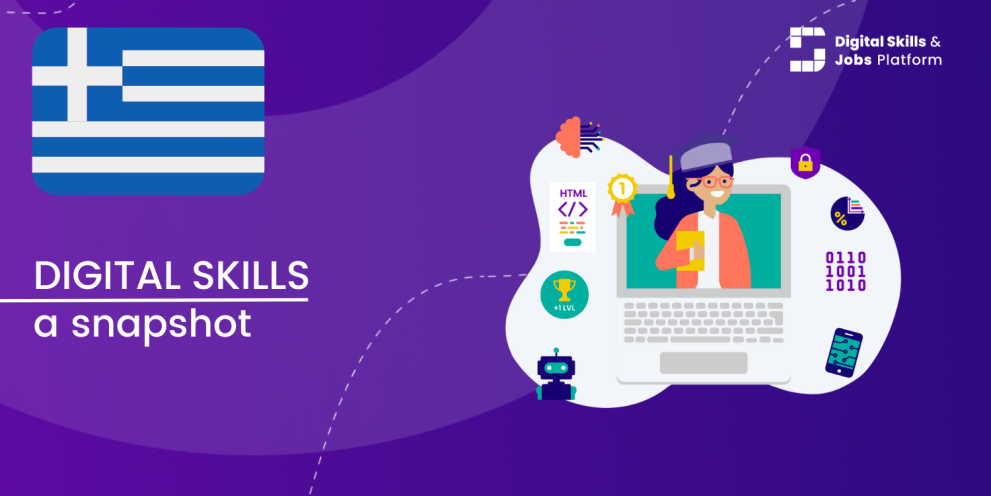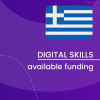Greece: a snapshot of digital skills

Introduction
In the 2024 edition of the Digital Decade report, Greece has achieved 52.4% basic digital skills coverage, compared to the EU average of 55.6%. The score is under the EU average, and slightly below the 2023 results (52,5%).
According to the Digital Decade Report 2024, Greece performs slightly below the EU average in both digital skills indicators. The percentage of ICT specialists in employment has declined from 2,5% in 2023 to 2,4% in 2024, below the EU average of 4,8%.
Microsoft's Digital Futures Index in 2022 measured the digitalization level of 16 European countries, including Greece. The Index brings data about the level of digitalization of the country and detects the most successful areas, but also the areas where there is more work to be done to accelerate the digital transformation process. Digitalization is perceived through 5 categories of digital development: Digital Business, Digital Government and Public Sector, Digital Infrastructure, Digital Sector, and Human Capital. The overall level of Greece’s digital development score is 81, which is 17% below the CEE average. Compared to the Central and Eastern European countries, Greece is ranked below average in Digital Business, Digital Government and Public Sector, Digital Infrastructure, Digital Sector but above average in Human capital, 96.94 compared to 100.
The Greek National Coalition for Digital Skills and Jobs is a platform for collaboration between public and non-public entities that strive to advance digital skills in Greek society. Goals of the National Coalition are cooperation between all stakeholders to implement measures with the objective of enhancing digital skills, resolve the digital divide in all sectors of the Greek economy and society and to disseminate EU digital skills policies in Greece.
Overview of state strategies and national initiatives
State strategies
The Digital Transformation Bible is the main strategic document, which sets priorities for the digital transformation of Greece in period 2020 - 2025. It outlines the guiding principles, strategic axes, and interventions on a horizontal and vertical level that aim to enhance and support the digital transformation of Greek society and economy. It sets out the strategic roadmap for Greece’s digital transformation over the next 5 years. The strategy covers six pillars: (i) connectivity; (ii) digital skills; (iii) digital state; (iv) digital business; (v) digital innovation; and (vi) integration of digital technology in every sector of the economy. As upskilling goals it states digital Investment in the human resources, national portal for digital capabilities and Dissemination of initiatives on digital skills in Greece, which are aligned to latest EU policies.
Digital Transformation Program (PPsiMet) 2021-2027 which is financed by the ERDF and EKT+, contributes to the vision for Digital Greece and to the promotion of the economic transformation of the country through: The provision of new and upgraded public digital services and applications to businesses and citizens, ensuring the interoperability of digital systems and services, development of digital platforms to support business activity, digital transformation of local government, Ensuring ultra-high speed connectivity, meeting the needs in digital skills and integration of cutting-edge technologies. The 2021-2027 PPSiMet Budget amounts to €943,004,309.
National initiatives
Greece’s recovery and resilience plan supports the digital transition with investments and reforms in the digitalisation of public administration and private sector companies, in connectivity, and in digital skills. It will invest €160 million for the development of 5G networks, €1.3 billion in the digital transformation of the public sector and another €375 million for the digitalisation of businesses, promoting the integration of digital technologies in SMEs. Furthermore, the plan will invest more than €500 million to promote the digital transformation of the education and health system, while nearly €750 million will be invested in digital upskilling. In 2022, several measures to modernise and digitalise the public sector are launched, e.g., projects to digitalise archives and related services (EUR 598 million); developing interoperability and web services; and modernising the public administration’s, reform to deliver on the cybersecurity strategy for the public sector and measures to improve connectivity.
Digital Transformation of SMEs introduces a support scheme that supplies vouchers to SMEs which can be used for the purchase of digital technologies and related services. Via an online platform, SMEs can easily apply for support and select a digitalisation solution that fits their needs. The project also includes advisory support for developing new digitalisation solutions. Upon completion, the project is expected to provide digitalisation support to at least 100,000 SMEs via the voucher scheme and help at least 1,000 SMEs to develop new digital solutions.
More than 500,000 students, ages 4 to 24, from low-income families and more than 150,000 teachers of primary and secondary institutions were provided with a voucher of EUR 200 towards the purchase of a tablet, laptop, or desktop computer. The measure "Vouchers to students for laptops and other IT stuff" targeted low-income individuals while promoting the digital transformation of the education system. During the pandemic, when schools were closed and lessons were delivered exclusively online and required the use of an IT device, the initiative facilitated access to e-learning.
In 2023, training programmes for unemployed and private sector employees seek to train an additional 150,000 private sector employees, including SME employees, in digital, environmental, and financial literacy. Training providers belong to both the public and private sectors and satisfy certain quality assurance criteria. Combined with a reform of the national lifelong learning system, the investment improved the delivery model of upskilling and reskilling programmes, as well as the skills intelligence tools used to forecast skills needs, which enhanced the system's ability to provide high-quality and labour market-relevant training to those who require it. More information.
Funding opportunities
Funding opportunities for upskilling and reskilling to support the digital competences of individuals and organizations are available in form of loans, grants and financial instruments. For the period 2021 – 2026 most of the activities in digital transformation are financed through Recovery and Resilience facility but also as activities in Horizon, Erasmus+, ESIF and EEA grant schemes. You may find more on the page of Greek National Digital Skills and Jobs Coalition and in the article on the Digital Skills and Jobs Platform.





